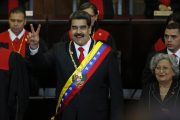As expected, the Colombian Marxist traitor, President Juan Manuel Santos (shown, left), has concluded the peace of the cemetery with the bloody communist guerrillas on August 24, 2016 in Havana, Cuba after nearly four years of negotiations. The agreement is a complete and shameful surrender to the bloody communist rebels of the Revolutionary Armed Forces of Colombia (Fuerzas Armadas Revolucionarias de Colombia, known as FARC), who are responsible for more than 200,000 deaths, tens of thousands of injuries, and millions who were forced to abandon their homes during a more than half-century of conflict assisted in every way by the Cuban regime. The agreement will not bring peace but a future communist take over as happened in El Salvador.
President Santos stated in a televised speech, “We have reached a final accord, complete and definitive, to end an armed conflict with the FARC.”
Juan Forero wrote an article entitled “Colombia and FARC Rebels Conclude Peace Deal” that was published in the Wall Street Journal on August 27, 2016. The reporter explained that the negotiations began openly in November 2012 in Havana, Cuba, but had been going on secretly for a year and a half. Santos said he would present the accord to Congress on August 25 and then request electoral authorities to organize a nonbinding referendum asking Colombians if they approve of the deal with the FARC on October 2, 2016. “With negotiations and the accord concluded, it’s in your hands, that of all Colombians, to decide with your vote if you support this accord,” said Santos, speaking in Bogotá. He said the five points of the pact give Colombia, riven by various guerrilla forces in recent decades, the chance to “construct a stable and long-lasting peace.” Luciano Marín, a top guerrilla negotiator best known to Colombians under the nom de guerre Iván Márquez said, “I think we have won one of the most beautiful battles, peace in Colombia.”
Forero explained that the accord calls for the Colombian government to work with the FARC to mitigate drug trafficking in areas where the guerrillas had influence, permits the FARC to transform into a political party, establishes a system to investigate war crimes by both rebels and military personnel, and lays out how to compensate victims. According to the agreement, the FARC would congregate their 7,000 fighters in 23 hamlets and eight 10-acre encampments scattered across rural Colombia. There, they would turn in their weapons to a United Nations verification commission over a six-month period.
The timeline for the final peace deal and disarmament is tricky. The Obama administration, which has given the bloody Castro regime a series of shameful unilateral concessions and has done nothing to help the opposition in Cuba and Venezuela, has helped Santos to turn Colombia to the killers who make up FARC. “They will vote on it,” said Bernard Aronson, the U.S. envoy who helped find common ground between the two sides in the talks.
Forero said the following: “The Santos administration, which leaves office in 2018, is also racing to win congressional approval in the coming weeks for a tax overhaul to finance what economists here say would be a multibillion-dollar program to implement the peace accords, including an ambitious modernization of long-forgotten rural regions. Congress will also be asked to approve a proposed amnesty law, which took shape during the Havana talks, for low-level rebels accused of rebellion or taking up arms against the state. Guerrilla commanders accused of war crimes, though, will go before special tribunals. If rebel chiefs admit to their role in war crimes, their punishment could include restrictions on their movements, reparations to victims’ families and providing information on how victims died.”
Former President Álvaro Uribe, who calls the deal a sellout to the FARC, is vowing to fight on.
Opponents of the talks, led by former President Uribe, said the Santos administration had ceded to terrorists. “What they have done in four years in Havana, with waste and exaggerated spending by the state, they could have done in one day: Santos ceded everything,” said Senator Ernesto Macías, who is in Uribe’s coalition.
The bloody FARC communist guerrillas, who are responsible for the deaths and injuries of tens of thousands of Colombians with the help of the Cuban regime, will be guaranteed five seats in Colombia’s 102-seat Senate and five seats in the 166-seat House of Representatives, a representation of, respectively, five percent and three percent.
Shamefully, under the signed deal, three former rebels would serve in the House of Representatives and in the Senate in a nonvoting capacity, permitting the ex-combatants to have a say in the implementation of the accords. In the 2018 congressional elections, the FARC would be guaranteed at least five seats in the House and five in the Senate. The mechanism to permit former rebels to have that many seats will necessitate a constitutional reform that was agreed upon in Havana.
Adriaan Alsema wrote an article entitled “FARC to take part in Colombia’s 2018 elections, but with guaranteed seats” that was published in World Affairs on August 25, 2016. The reporter explained that the peace agreement presented to the public on August 24, 2016 will facilitate the communist guerrilla’s transition from an illegal armed group to a political party, noting that FARC will receive their five guaranteed seats in the Senate and House until the 2026 elections. After that, the former guerrillas will have to obtain votes like any other political party.
FARC’s bloody rebels will take part in the 2018 elections as a formal political party, but this is mainly a political warm-up. Before the 2018 elections, the FARC cannot be involved in political violence and will have to have comply with electoral regulations that demand for it to have a party statute and be formally registered with electoral authorities. However, the FARC’s road to their 2018 political participation is long and uncertain.
First, the FARC will hold their 10th guerrilla conference, in which it will dissolve itself as a self-proclaimed armed insurgent group. If the deal is approved, it will be formalized by President Santos and FARC commander-in-chief Rodrigo Londoño Echeverri, known as Timoleón Jiménez or “Timochenko.”
The main problem is getting Colombians to approve the deal in an October plebiscite meant to give the deal political legitimacy.
Santos, as he handed the accord to the president of Congress, Mauricio Lizcano, stated the following: “We are giving the public the last word about peace in Colombia, and it will be the people who on October 2 will say, ‘Yes, we want peace. Peace is always better than war. Peace will take away the fear that all Colombians have grown up with after so much armed conflict.”
The Marxist Santos is very unpopular, with an approval rating is around 25 percent in a poll released earlier this month by Ipsos, owing to his appeasement in negotiating with the FARC, a slow economy, and high inflation. Colombians remain skeptical on the accord. Indeed, 75 percent of those questioned in the Ipsos poll said demobilized guerrillas should not be permitted to participate in politics, as the accord would allow them to do.
Many critics of the shameful accord feel it is too lenient with these criminals. For example, none of them will go to prison, in spite of the massacres and other atrocities that they have committed. Moreover, each guerrilla will receive a salary of over $200 a month without working. The Colombian government does not know how much the peace accord will truly cost, since the number of FARC guerrillas in the field is estimated to be between 7,000 to 9,000 fighters, with as many as three times that number of urban guerrillas.
The bloody killers will escape prosecution for their many serious crimes. A system of justice set up by the accords can punish those who committed atrocities but only via “extremely modest” sanctions, said José Miguel Vivanco, the Americas director of Human Rights Watch.
With help from the tyrannical Cuban regime the FARC rebels have been responsible for 260,000 deaths, the disappearance of 45,000 individuals, tens of thousands of injuries, and between 6 and 8 million who had to abandon their homes. Fidel and Raúl Castro have helped the FARC for more than 50 years. For over 50 years the FARC has been involved in narcotics trafficking and the profits are estimated to be over $30 billion. More than likely, FARC leaders have their funds in foreign banks or invested in businesses. The FARC should pay the salaries of its fighters, money for its future political party, and for any new business it wishes to create. The people of Colombia, especially the tens thousands of victims or their relatives of the terror perpetrated by the terrorists of the FARC, should give a cent to these killers. When the FARC criminal leaders are able to run for president, governor, and Congress with billions earned by selling drugs to America and the world, these terrorists can be elected to high office, as it happened in El Salvador. The United States president participated in the shameful negotiations and has already pledged millions of U.S. taxpayers’ funds to subsidize the peace accord.
Forero and Vyas said that Luis Alfonso Muñoz, a 54-year-old agricultural entrepreneur, is very aware of the violent acts the FARC have committed in Colombia’s far-flung rural regions. Like many Colombians who oppose the pact, he said he rejects provisions that would likely spare rebel commanders from facing time in jail while the government provides monthly wages to rebels as they disarm. “It’s not just,” he said. “There are many doubts about that. I’m voting no because I disagree with the benefits the government is providing the guerrillas.” As mentioned earlier, the biggest hurdle may be Santos’ former boss, Senator Uribe, the former president who has made turning back the plebiscite his calling.
Further, there are concerns that the FARC will not even comply with the terms of the dangerous deal. “Another worry is that breakaway factions in the FARC have announced that they won’t lay down their weapons, no matter what the negotiators in Havana have decided,” the Journal said. “Part of the reason may be ideological, but the larger incentive is the FARC’s lucrative cut of the drug business. Hardened killers aren’t likely to trade their percentage in the cocaine trade for government-sponsored development schemes in remote Andean provinces.”
If the deal does end up being approved, the editorial added, the FARC may “exploit the political concessions to undermine democracy,” including by making false accusations against police and the military that the terrorists will seek to destroy or weaken. Examples of similar “peace deals” in Latin America also suggest this one will not end well. Indeed, the Colombian deal is modeled on El Salvador’s 1992 deal. Today, that nation is ruled by a Marxist mass-murder who helped lead the Soviet-backed war of terror.
August 24, 2016, the day that President Santos announced the agreement with the leaders of FARC guerrillas, is a day that will live in infamy in Colombia. Colombians need to remember that slavery under communism is worse than war. Dishonor is worse than war. Fighting and wiping out the estimated 7,000 to 9,000 guerrillas in the field as well as whatever number the FARC has in urban areas, is much better than allowing communists, supported by the Castro regime, to rule in Colombia. Colombians need to look at Venezuela and Cuba and vote “NO” on this terrible accord on October 2, 2016.
It is this writer’s hope that Colombians will reject this shameful accord. However, someone needs to look at the voting machines in Colombia to ascertain that Venezuela’s Smartmatic software is being used in the electronic voting machines. Otherwise, the Marxist President Santos will win regardless of how the people vote.
2015 photo of Colombian President Juan Manuel Santos (left) with Cuban President Raúl Castro (center) and FARC leader “Timochenko” (right): AP Images
Frank de Varona is an educator, historian, journalist, and internationally known expert on politics who fought against and was captured by the Fidel Castro regime in the Bay of Pigs attack. A version of this article was originally published by the anti-communist group Bear Witness Central, where Frank serves as director for South Florida. It is republished here with permission.
Related articles:
Obama-backed FARC Deal a Bonanza for Marxist Terrorists
Obama Pushes Amnesty for Marxist Narco-Terrorists in Colombia
Communist Mass-murderer Wins Suspicious El Salvador Election
Globalists and Gangs Back Marxist Mass-murderer in El Salvador
Obama Pushes Amnesty for Marxist Narco-Terrorists in Colombia
Amid Obama Visit, Che Guevara’s Son Vows Communist “Tsunami”
Obama Pushes Communist Vision of “Rights” on Cuba Trip
Obama Set to Remove Castro Terror Regime from U.S. Terror List
Resurgent Communism in Latin America
Obama’s Political Career Began With Castro-backed Terrorist
Globalists, UN, and Big Business Legitimizing Cuban Regime
Exposure of Radical CFR Latin America Boss Offers Broad Insight
Obama Showers Support on Communist Terrorists in Syria, Iraq




